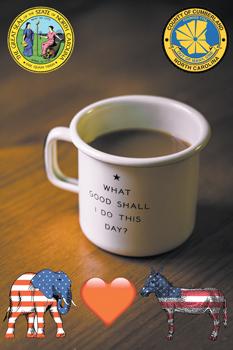 Well, it’s done. Love it or hate it, the results are in. There are some new political players both nationally and locally, but how much is that going to change things, really?
Well, it’s done. Love it or hate it, the results are in. There are some new political players both nationally and locally, but how much is that going to change things, really?
The mortgage is still due on the first. The office still beckons on Monday. Chores still need doing, and errands still need running. While our leaders have big decisions to make, from day to day, we all still have lives to live and dreams to chase. I still get to choose how to spend my time, my money and my energy. We all do. There are big issues on the table and conflicts in ideologies in play. But it’s not the first time and won’t be the last.
It’s been said that all politics is local. Maybe that is true, maybe not. But local is where we live and where we can make a significant difference all year long, elections or no elections. Local is where we invest our time and talent. It’s where we spend our money and build our lives. No matter how many votes your candidate got last Tuesday, there is plenty we can all do on a personal level to effect the change we want to see.
Regardless of your cause, there is a way to support it – locally. Donate. Volunteer. Educate. Organize. Serve. Give back. There are countless opportunities to make a difference, no matter which party is in power. Helping one another on a personal level builds relationships and community in a way a tax break, a check from the government or a public policy change cannot.
It is something we should all do. Study after study shows that being kind, altruistic and compassionate not only benefits the receiver, it positively affects the doer, too. An article titled “The Science of Good Deeds,” by Jeanie Lerche Davis, explores this concept and offers example after example of how helping ourselves and helping others is good for us – so good that it causes positive changes in our body chemistry – and good for our communities, too.
For example, the article notes, “Two large studies found that older adults who volunteered reaped benefits in their health and well-being. Those who volunteered were living longer than nonvolunteers. Another large study found a 44 percent reduction in early death among those who volunteered a lot – a greater effect than exercising four times a week.”
But that’s not all. There’s evidence in brain studies of a compassion-altruism axis.
According to the article, “Utilizing functional MRI scans, scientists have identified specific regions of the brain that are very active during deeply empathic and compassionate emotions.”
Stephen G. Post, Ph.D., a professor of bioethics at Case Western Reserve University School of Medicine, is quoted, “These brain studies show this profound state of joy and delight that comes from giving to others.”
Take a minute and celebrate your victory or mourn your loss from last week’s election, and then go make a difference. Put actions behind your beliefs. Work to make your community the place you want it to be. Our leaders have big problems to solve, even if many of them are of their own making. That doesn’t mean we are off the hook. There are plenty of local problems we can solve if we each give what we can when and where we can.
Read the complete article “The Science of Good Deeds” at www.webmd.com/balance/features/science-gooddeeds#3. Thank you for reading Up & Coming Weekly.

 How to resolve AdBlock issue?
How to resolve AdBlock issue? 








